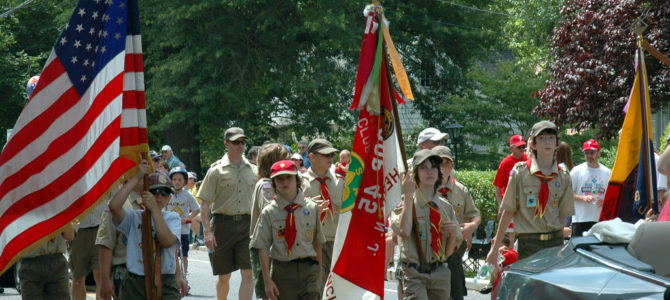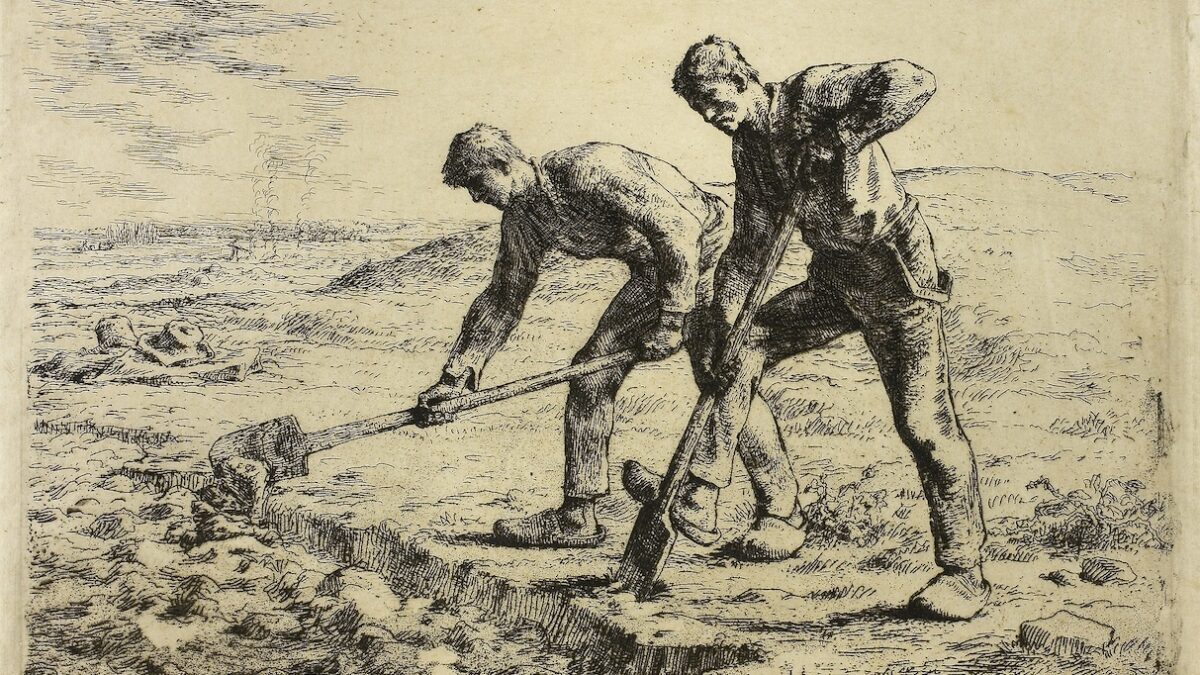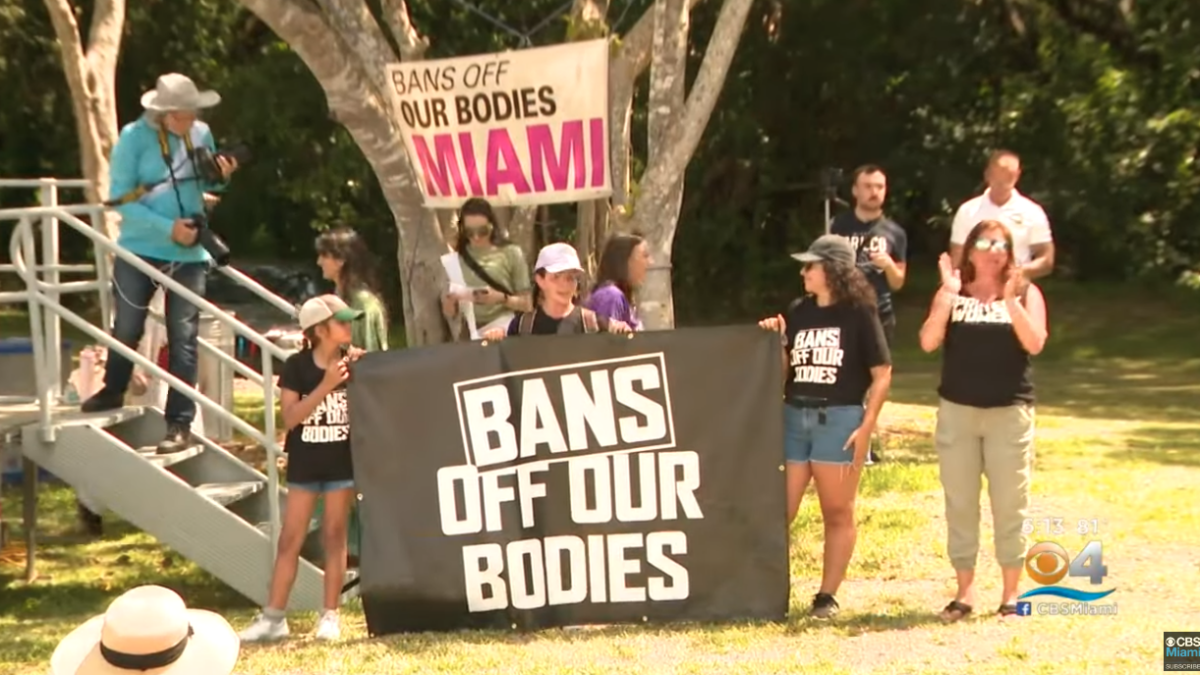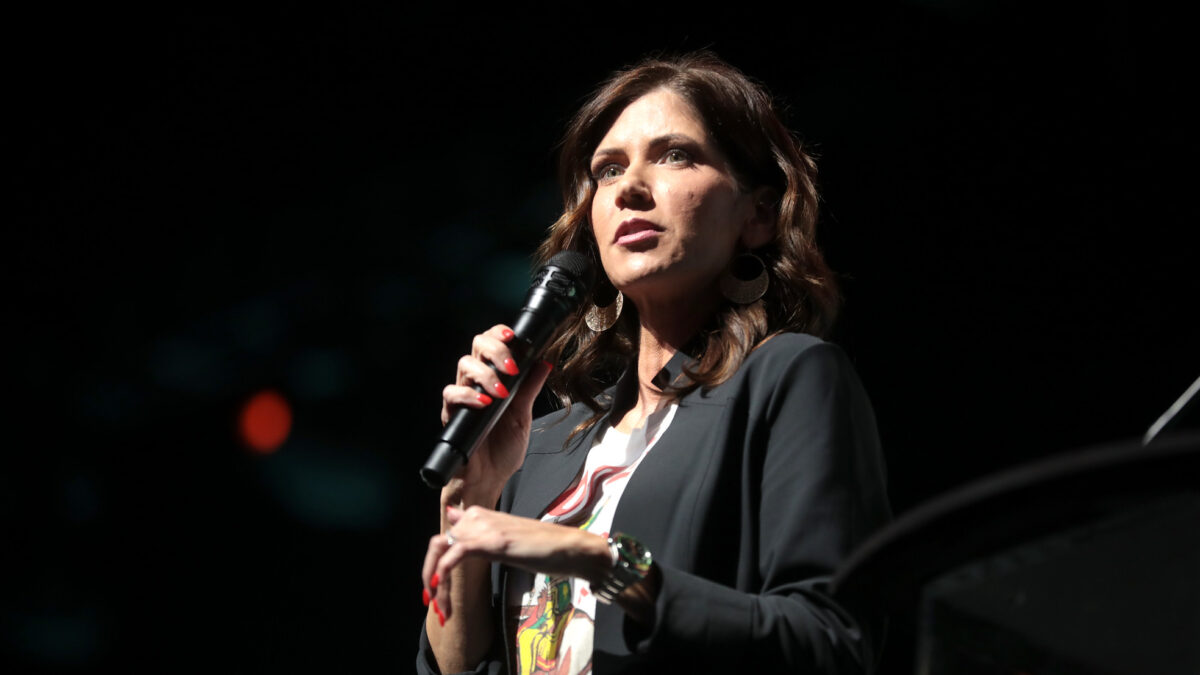
Every other Monday evening, a chaotic scene erupts at our local Presbyterian church. Young boys of all ages dart around, happily calling to each other across the room, alternating between sprints, tackles, and boisterous discussion of the latest update from Minecraft or their favorite YouTube star.
Eventually, a man in a tan shirt steps to the front, his hand held high in “the quiet sign.” A few minutes later, with the boys settled down, the ritual begins. It starts with the pledge, and is followed by the sacred words: “On my honor, I will do my best, to do my duty, to God and my country and to obey the Scout Law; to help other people at all times; to keep myself physically strong, mentally awake, and morally straight.”
Next comes: “A Scout is trustworthy, loyal, helpful, friendly, courteous, kind, obedient, cheerful, thrifty, brave, clean, and reverent.”
When they are young, they struggle with the words, their faces scrunched as they try to remember the order. When they are older, they recite in monotone, the words slipping off their lips in a way that makes you wonder if they are internalizing the importance of the words.
Rituals for Becoming Men
The rest of the meeting slips by. If it’s just a den meeting, focused on one age group, the boys work on a practical skill with a moral backdrop. They might identify leaves and plants while learning the importance of conservation. Or they may practice whittling, learning the importance of care with a knife and the “blood circle” for maintaining a safe distance from others.
Regardless, each lesson provides each with an opportunity to speak up and share a story, serve as a group leader, and develop mindfulness in helping (or staying safe from) their fellow scouts. The meetings are loud, energetic, and more than a little disorderly. After eight long hours in school, the boys are obviously intoxicated by this one hour of hands-on, rough and tumble time with their pals.
Full pack meetings are different. They provide practice in public speaking, get the boys out of their comfort zones through funny skits and songs performed for all, and frequently have a program one particular den took responsibility for planning and practicing in advance. The boys always leave full of smiles, proud of their participation even if they are too cool to admit it.
As a mother and an assistant den leader, these bimonthly rituals have a place of sacred significance. I remember watching my older brother advance to Eagle Scout, admiring the practical skills, sense of greater responsibility, and strong self-motivation he developed. I eagerly waited for my son to come of scouting age, and relished watching him throw himself into the activities with reckless abandon.
In a world where masculinity is too often thought of as toxic and men disappear from the labor force, marriage, and self-sufficiency, scouting was our safe space, a place boys could be taught as boys, by men, on the importance of developing into strong leaders with outstanding moral character. I’ve watched the men who lead our troops sacrifice so much of their lives, hoping that their tireless work imparts some nuggets of wisdom to help these young men follow the right path.
The Costs of Adding Girls to a Boys’ Space
The Boy Scouts of America’s decision to begin allowing girls raises many questions for me. The first are practical. Despite the directive to allow separate dens at the Cub Scout level and forced separation at the Boy Scout level, it’s hard to imagine enough young girls joining Cub Scouts to fill a tiger troop on their own. The Boy Scouts have struggled with declining membership, experienced even by our local troop as we’ve increased recruitment efforts at local schools and community events. Recruiting a few girls across a wide age range seems more likely to yield mixed dens at the young ages, similar to my son’s Little League teams, which frequently had one or two girls in the mix.
Even if it remains separate at the den level, will full pack meetings continue to be separate? If so, it seems to cut into the argument that the program wants to be an inclusive one-stop-shop for busy parents with separate meetings to attend, award ceremonies to photograph, and weekend activities, even assuming they occur simultaneously. It either will require the same additional parenting time something like Girl Scouts requires, or require the busy families and single moms the Boy Scouts claim to be catering toward to be in two places at once. It seems likely, then, in the end, for more things to be combined than not, both for practical reasons and because everyone knows separate but equal really isn’t equal.
Overworked leaders would find additional recruitment for separate dens, increased logistical challenges, and to some extent, additional burdens on the churches and community organizations that host these troops if everything runs on separate tracks. As an assistant den leader, the possible challenges to running some combination of separate and single tracks makes my head spin.
So, What’s the Point of Scouting?
But certainly our girls and the development of their moral character is worth some additional logistical challenge. That is, after all, why so many families already do both Girl Scouts and Boy Scouts, or put their girls into whatever program they think will best develop them into strong women capable of taking on the world. My parents chose both Boy Scouts and Girl Scouts, as well as other mentally, spiritually, and physically enriching activities, from debate club to piano lessons to church clubs and soccer. The real question cuts to the heart of scouting itself, and its purpose in the modern age.
When my son was two, we moved hundreds of miles from home in Georgia to the DC area. I was excited for the many opportunities he’d have living in our nation’s capital. The good local schools, the countless enrichment activities, and the cultural experience would all provide him an excellent foundation.
But I was also nervous. Although my hometown had many individuals, especially men, experiencing failure to launch, I was also aware I was removing him from family and an established community for the unknown, and that I needed to recreate that community if he didn’t have grandfathers and uncles to pass along life lessons he’s less keen to learn from mom.
Scouting for me was an important part of that plan. The scout oath and law embody what I want my son to become, and stand in stark contrast to the path many men are following. To do his best to do his duty, rather than avoiding hard work and labor. To be trustworthy, loyal, and courteous rather than take advantage of those around him, especially women. To be thrifty, rather than indulgent. To be cheerful and brave, rather than giving in to hopelessness.
Maybe the decline of men in and of itself is a condemnation of the utility and marketability of the Boy Scout program. After all, the program is dedicated to turning men into leaders, not shirkers. Scouting numbers have dwindled in concurrence with men disappearing from social life. But with growing recognition of the problem facing men, scouting is well-poised to serve as one answer.
If Female-Specific Is Good, Why Isn’t Male-Specific?
We all acknowledge the importance of having a safe place for girls, where they can confront and discuss the unique challenges we face as women, learn to be strong and self-sufficient, learn to work together, and celebrate who they are and what makes them unique. The countless programs that have developed just for girls from STEM camps to girls-only running clubs to the Girl Scouts themselves have helped build a strong foundation for female empowerment.
We’ve learned as a society that having female-specific spaces and clubs aids in development. It’s not that girls don’t need to embody the lessons taught in the Boy Scout Oath and the Boy Scout Law, it’s that we know they face different challenges, and displaying those moral characteristics means different things based on different circumstances. Having a place to teach those virtues to girls, by women, creates a unique opportunity for discussion and bonding.
Boys deserve the same. We can’t simultaneously deride the disappearing man, moan the toxic effects of untethered masculinity, and demand virtue without providing a place to teach it in a way that’s tailored to boys’ learning styles and interests. Boy Scouts provides an outlet where boys push and learn boundaries in their pack, develop integrity and social responsibility, and practice effective leadership.
As I think back on my last five years as an assistant leader, I remember the countless times the boys tested themselves and each other. I remember the boy struggling with his parents’ divorce and the ramifications of new people in his life, I remember the boy who struggled in school with abundant energy and focus issues, the boy who moved so frequently due to his family’s military status, and how scouting gave them all a home. For a few hours a month, they could let loose and learn.
I remember how they opened up about things on their minds, how their forced boyish emotional guards would come down, even if just for a few minutes, as they worked and talked with their fellow scouts and leaders, and how the moments could come crashing down in laughter after very boyish jokes that make a mother cringe. My son has struggles of his own, and I saw scouting teach him to handle them wisely and bravely. Each moment was important. I was grateful such a place still existed.
Scouts teaches boys how to process their feelings, channel their emotions, and tackle the world as men. It teaches them to explore and question in a judgment-free zone. Behaviors too frequently shut down on a school playground are indulged within reason. They learn to appreciate themselves for who they are, but also how to be the best version of themselves. They can connect their impulses and desires to a grander good, and see their places in the social order.
Will that continue after this decision? It’s hard to say. But it’s difficult not to view the recent BSA decision as one that chips away at the most important part of scouting. I doubt the decision will much affect the rest of my son’s experience as he moves on to Boy Scouts. But if the BSA, of all organizations, fails to understand the fundamental importance of its original mission, it’s hard to imagine how we can tackle the problems affecting men in the long-term.








